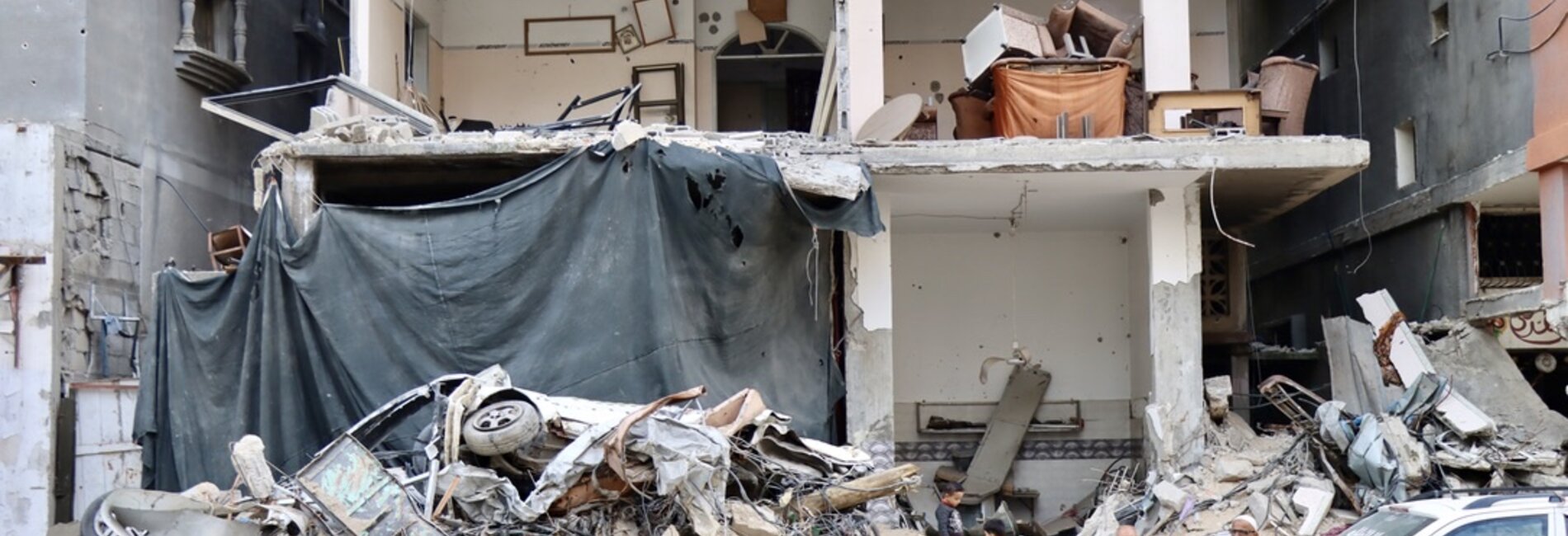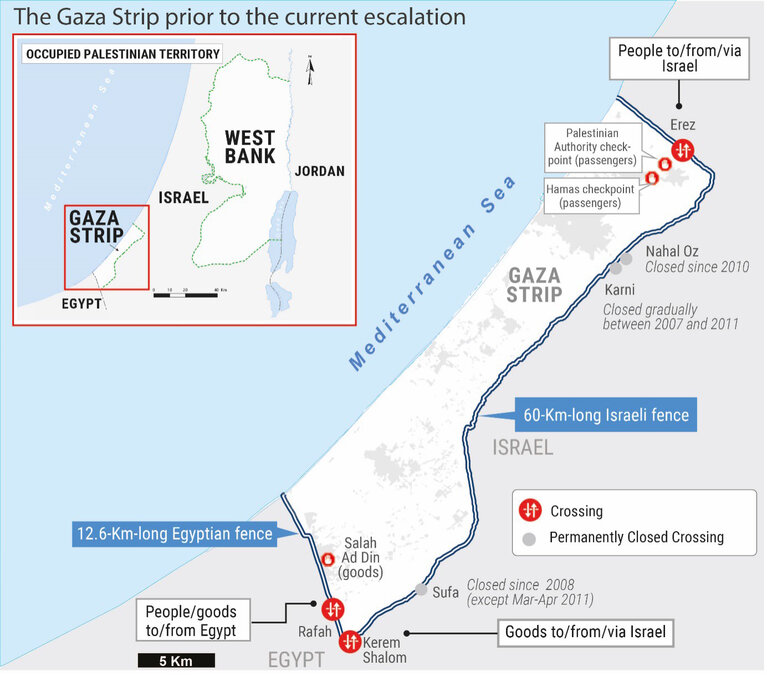Hostilities in the Gaza Strip and Israel | Flash Update #132
Key Highlights
- On 4 March, Al Awda Hospital in northern Gaza resumed partial operations after fuel and medical supplies were delivered by a UN inter-agency mission.
- The UNRWA Commissioner-General has said that the Agency is now functioning ‘hand-to-mouth’ following the decision by major donor countries to pause their funding.
- According to HelpAge, the decision by major donors to withdraw funding from UNRWA will worsen the plight of already deprived Palestinian civilians, including older people.
- A 10-year-old Palestinian child was killed by Israeli forces in Burin village (Nablus). Since 7 October, 107 Palestinian children have been killed in the West Bank, including East Jerusalem.
Gaza Strip Updates
- Intense Israeli bombardment and ground operations as well as heavy fighting between Israeli forces and Palestinian armed groups continue to be reported across much of the Gaza Strip, resulting in further civilian casualties, displacement, and destruction of houses and other civilian infrastructure.
- Between the afternoon of 4 March and 10:30 on 5 March, according to the Ministry of Health (MoH) in Gaza, 97 Palestinians were killed, and 123 Palestinians were injured. Between 7 October 2023 and 10:30 on 5 March 2024, at least 30,631 Palestinians were killed in Gaza and 72,043 Palestinians were injured, according to MoH in Gaza.
- Between the afternoons of 4 and 5 March, the Israeli military reported no Israeli soldiers killed in Gaza. As of 5 March, 244 soldiers have been killed and 1,453 soldiers injured in Gaza since the beginning of the ground operation, according to the Israeli military. In addition, over 1,200 Israelis and foreign nationals have been killed in Israel, the vast majority on 7 October. As of 5 March, the Israeli authorities estimate that 134 Israelis and foreign nationals remain captive in Gaza, including fatalities whose bodies are withheld.
- On 4 March, the Israeli military announced that its forces had encircled the Hamad area in western Khan Younis and conducted a night-time operation reportedly targeting armed groups’ infrastructure and facilities from the air and the ground. According to the military, a corridor was established for civilians to exit the area, following the issuing of an evacuation order on 3 March which instructed the residents of Hamad area to evacuate to Al Mawasi.
- Hospitals in Gaza continue to face severe disruptions in providing health care. On 4 March, MoH in Gaza announced that, since the onset of the conflict, 155 health facilities had been damaged, and 32 hospitals and 53 health centres had been rendered non-functional, due to attacks or shortages of essentials. In addition, 126 ambulances had been damaged and rendered unusable. The ministry further reported that 269 medical staff, including hospital directors in Gaza, had been detained by Israeli forces. Al Awda Hospital in Jabalya resumed partial operations on 4 March after fuel and medical supplies were delivered by WHO, OCHA, UNICEF, and UNFPA as part of a UN inter-agency inspection mission of hospitals in North Gaza. The hospital had to stop operations on 28 February, due to a lack of electricity, depletion of fuel, and shortages of medical supplies. On 3 March, the Palestine Red Crescent Society (PRCS) reported that Israeli forces were maintaining their siege of Al Amal Hospital in Khan Younis for the forty-second consecutive day. As a result, there is a severe shortage of essential supplies, including food, water, and fuel. Additionally, medical supplies for chronic diseases and laboratory necessities have reportedly been depleted.
- On 4 March, the UNRWA Commissioner-General, Philippe Lazzarini, addressed the UN General Assembly. In response to Israeli allegations of the involvement of UNRWA staff from Gaza in the 7 October attacks on Israel, 16 donor countries have paused their funding, amounting to a US$450 million loss to the Agency. In the West Bank, the Israeli authorities have initiated measures against UNRWA, including banning local staff members from entering East Jerusalem, which is affecting all its services. As a result of these measures, the Commissioner-General warned that UNRWA is functioning ‘hand-to-mouth’ and that the fate of the Agency, and the millions of people who depend on it across its five fields of operation, ‘hang in the balance.’ In Gaza, the collapse of the Agency would result in immense human suffering as ‘only UNRWA has the footprint and the capacity to deliver services … in the absence of a full-fledged state authority.’ The Commissioner-General also stated that ‘UNRWA’s mandate embodies the promise of a fair and lasting political solution’ and that ‘dismantling the Agency in Gaza and the West Bank, including East Jerusalem, would only serve those who oppose such a solution.’
- According to HelpAge, the decision by major donors to withdraw funding from UNRWA will worsen the plight of already deprived Palestinian civilians. Prior to the current hostilities, older people in Gaza were already living with the long-term impact of conflict and displacement, with reduced access to essential health and social services. Anecdotal evidence indicates that the number of older people living in designated shelters is disproportionately high in the north of Gaza. The suspension of funding directly affects the health and well-being of older people, who are likely to lack the necessary medications for non-communicable diseases, and are also at risk of isolation, trapped in combat areas, and facing starvation due to food insecurity, the organization says. HelpAge calls upon ‘governments to reassess and backtrack on their decisions to withdraw funding from UNRWA. The humanitarian crisis unfolding demands collective responsibility and a commitment to the well-being of the most vulnerable and those who need it the most, including Gaza’s older people.’
- The following are among the deadliest incidents reported between 3 and 4 March:
- On 3 March, at about 19:30, eight Palestinians were reportedly killed, and others injured when a house in Khirbet Al Adas neighbourhood, in Rafah city, was struck.
- On 3 March, at about 20:00, 12 Palestinians were reportedly killed, and 42 others injured, when a residential building in the second camp in An Nuseirat, in Deir al Balah, was struck.
- On 3 March, at about 21:50, seven Palestinians were reportedly killed, and others injured, when a house near Al Awda Roundabout, in central Rafah, was struck.
- On 4 March, at 0:45, 13 Palestinians were reportedly killed when a house in Jabalya Camp, in North Gaza, was struck.
West Bank Updates
- On 4 March, Israeli forces shot and killed a 10-year-old Palestinian child during a raid in Burin village, in Nablus governorate, which escalated into clashes between the Israeli army and Palestinian stone throwers. Community sources reported that the child was fatally injured while he was in a vehicle with his father, and that two other Palestinians were injured while they were trying to assist them. Since 7 October, 107 Palestinian children (including 106 boys and 1 girl) have been killed in the West Bank, including East Jerusalem, including 105 killed by Israeli forces, one by Israeli settlers, and one by either Israeli forces or settlers. Overall, since 7 October, 413 Palestinians have been killed and 4,645 Palestinians have been injured, including 712 children, in conflict-related incidents across the West Bank, including East Jerusalem, and Israel.
- Since 7 October, 15 Israelis, including four members of Israeli forces, were killed and 88 injured in conflict-related incidents in the West Bank, including East Jerusalem, and Israel.
- On 2 March, a Palestinian family was forced to demolish their newly built three-storey residential building in Al ‘Isawiya in East Jerusalem due to the lack of Israeli-issued building permits. As a result, four households comprising 17 people, including nine children, were displaced. Since 7 October 2023, 616 people, including 294 children, have been displaced in Area C and East Jerusalem after their homes were demolished due to the lack of Israeli-issued building permits, which are almost impossible to obtain.
- In the late hours of 3 March, the Israeli authorities demolished on punitive grounds a house in Nablus city, displacing one person. During the demolition, clashes erupted between Israeli forces and Palestinians, resulting in the injury of 15 Palestinians. The house belonged to the family of a Palestinian man accused of killing three Israeli settlers in the Jordan Valley on 7 April 2023, and was himself killed during a military operation in Nablus city on 4 May 2023. On 5 March, another house was punitively demolished in Kafr Dan village in Jenin, displacing a family of seven, including two children. The house belonged to the family of two brothers who were detained after being accused by the Israeli authorities of being involved in the shooting attack in Huwwara on 19 August 2023, which resulted in the killing of two Israelis. Since 7 October, a total of 25 houses have been punitively demolished and two others sealed off, leading to the displacement of 129 Palestinians, including 53 children.
- Israeli forces carried out a military operation in Nur Shams Refugee Camp in Tulkarm, during which an exchange of fire took place between Palestinians and Israeli forces. The operation resulted in extensive damage to roads connecting the camp with Tulkarm and Nablus cities as well as the destruction of electricity and sewage infrastructure. At least five livelihood structures were also damaged by bulldozers. Since 7 October, 853 Palestinians, including 350 children, have been displaced, following the destruction of 133 homes during operations carried out by Israeli forces across the West Bank. About 95 per cent of the displacement was reported in the refugee camps of Jenin, Nur Shams and Tulkarm.
- Since 7 October 2023, OCHA has recorded 615 Israeli settler attacks against Palestinians that resulted in Palestinian casualties (54 incidents), damage to Palestinian-owned property (491 incidents), or both casualties and damage to property (70 incidents).
Funding
- The Flash Appeal for the occupied Palestinian territory (OPT), which requests US$1.2 billion to meet critical needs of 2.7 million people across the OPT (2.2 million in the Gaza Strip and 500,000 in the West Bank, including East Jerusalem), was extended through the end of March 2024. As of 5 March, member states disbursed nearly $964 million against the updated Flash Appeal (78 per cent); this includes about $616 million out of $629 million (98 per cent) requested for October-December 2023 and $348 million out of $600 million (58 per cent) requested for January-March 2024. For funding analysis, please see the Flash Appeal Financial Tracking dashboard.
- The OPT Humanitarian Fund Unit (OPT HFU) is currently preparing for a more significant allocation to support response efforts under a ceasefire scenario, enabling a wider array of actors to participate in relief efforts. Priority sectors identified for immediate support include Food Security and Livelihoods (FSS), Multipurpose Cash Assistance (MPCA), WASH, Shelter, and Health, reflecting the most pressing needs in the Gaza Strip. Special attention is being given to directing funding and additional resources toward actors in areas that face significant access challenges, notably in central and northern Gaza. In the West Bank, innovative solutions are sought to address the impact of military activities on infrastructure and ensure operational effectiveness amid closures.
- The OPT HF and the Central Emergency Relief Fund (CERF) are currently funding more than 94 ongoing projects in the Gaza Strip to meet urgent humanitarian needs, notwithstanding constraints on the entry and delivery of aid into and within the Gaza Strip. These interventions, totalling about $88 million, address needs in the areas of food security, shelter, water, sanitation and hygiene (WASH), health and protection. Since 7 October, the OPT HF has received a total of $88 million in contributions from member states and private donors. Private donations are collected directly through the Humanitarian Fund.
For the Humanitarian Needs and Cluster Response Updates for the period between 27 February and 4 March, please visit: Humanitarian needs and response update | 27 February – 4 March 2024.
* Asterisks indicate that a figure, sentence, or section has been rectified, added, or retracted after the initial publication of this update.











